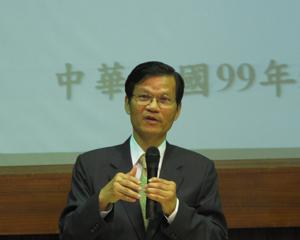Chi-Huey Wong
Lua error in package.lua at line 80: module 'strict' not found.
| Chi-Huey Wong 翁啟惠 |
|
|---|---|
 |
|
| Born | August 3, 1948 Chiayi County, Taiwan |
| Nationality | Taiwan United States |
| Fields | Chemistry chemical biology |
| Institutions | |
| Alma mater | National Taiwan University Massachusetts Institute of Technology |
| Notable awards |
|
Chi-Huey Wong (simplified Chinese: 翁启惠; traditional Chinese: 翁啟惠; pinyin: Wēng Qǐhuì or Wong Chi-Huey; born August 3, 1948) is a Taiwanese-born American biochemist. He is a professor of chemistry and chemical biology at The Scripps Research Institute in La Jolla, California. His expertise is bioorganic and synthetic chemistry, especially in carbohydrate chemistry and chemical biology.
He was an academician of Taiwan's Academia Sinica in 1994.
He was elected as a member of the American Academy of Arts and Science in 1996, United States National Academy of Science in 2002.
Biography
Wong received his BS and MS degrees from National Taiwan University in Taipei, Taiwan.
In 1982, Wong earned his PhD degree in Chemistry from Massachusetts Institute of Technology, in the United States, where he carried out research under the supervision of George M. Whitesides. He continued on as a postdoctoral researcher in the same laboratory after Whitesides had relocated to Harvard University.
In 1983, he joined the faculty at Texas A&M University, before moving to Scripps in 1989 as Ernest W. Hahn Chair in Chemistry.
As a pioneer in glycoscience research, Wong has developed the first enzymatic method for the large-scale synthesis of oligosaccharides and the first programmable automated synthesis of oligosaccharides. These methods have been used to solve major problems and create new opportunities in carbohydrate-mediated biological recognition and disease control. Of particular significance is his development of carbohydrate-based vaccines for the treatment of breast cancer and infectious diseases and glycan microarrays for the high-throughput analysis of protein-carbohydrate interaction. Overall, research in the Wong lab encompasses a broad spectrum of bioorganic and synthetic chemistry. Development of small molecules targeting proteins and RNA has been performed to investigate how small molecules interact with biologically important molecules and in turn, learn more about the function of those molecules. Development of both synthetic and bioorganic strategies is also paramount to his research. Programmable one-pot reactions are being developed for the synthesis of complex oligosaccharides and glycan arrays and complement his chemo-enzymatic strategies for the assembly of homogeneous glycoproteins with well-defined glycan structure and other biologically active molecules.
Since 2003, Wong became the founding director of The Genomics Research Center of Academia Sinica. He was later appointed by the President of the Republic of China to head Academia Sinica, the national academy of science in Taiwan. He took the office in October, 2006. He was awarded the F.A. Cotton Medal for Excellence in Chemical Research of the American Chemical Society in 2008, The International Enzyme Engineering Award in 1999, the US Presidential Green Chemistry Challenge Award in 2000, The American Chemical Society Claude S. Hudson Award in Carbohydrate Chemistry in 1999, the Creative Work in Synthetic Organic Chemistry in 2005, the Arthur C. Cope Award in 2012, and the Wolf Prize in Chemistry in 2014.[1]
Wong is currently involved in a possible insider trading scandal related to a biotech company OBI Pharma, Inc. headquartered in Taiwan. He had held shares in OBI Pharma for his daughter and himself. His funds were then invested in two other companies that had invested in OBI Pharma.[2] When the allegations surfaced in March 2016, Wong was in the United States.[3] He attempted to resign his position as president of the Academia Sinica twice while overseas. Both requests were rejected by the president of Taiwan, Ma Ying-jeou.[4] Wong returned to Taiwan in mid-April.[5] He presented a letter to the president during a meeting on 26 April, which stated that Wong would not formally resign, but hand administrative duties to the vice president of the Academia Sinica until a new leader was selected.[6] Shortly after the meeting, Wong's request for a leave of absence was rejected by Ma.[7] After further consideration, Ma chose to approve Wong's resignation on 10 May.[8]
References
- ↑ [1]
- ↑ Lua error in package.lua at line 80: module 'strict' not found.
- ↑ Lua error in package.lua at line 80: module 'strict' not found.
- ↑ Lua error in package.lua at line 80: module 'strict' not found.
- ↑ Lua error in package.lua at line 80: module 'strict' not found.
- ↑ Lua error in package.lua at line 80: module 'strict' not found.
- ↑ Lua error in package.lua at line 80: module 'strict' not found.
- ↑ Lua error in package.lua at line 80: module 'strict' not found.
- Y. Ichikawa, C.-H. Wong et al. "Chemical-enzymatic synthesis and conformational study of sialyl lewis x and derivatives" J. Am. Chem. Soc. 1992, 114, 9283-97.
- Z. Zhang, C.-H. Wong et al. "Programmable one-pot oligosaccharide synthesis" J. Am. Chem. Soc. 1999, 121, 734-53.
- K. M. Koeller, C.-H. Wong "Enzymes for chemical synthesis" Nature, 2001, 409, 232-40.
- P. Sears and C.-H. Wong "Toward automated synthesis of oligosacchadides and glycoproteins" Science 2001, 291, 2344-50.
- Y.-L. Huang, C.-H. Wong et al. "Carbohydrate-based vaccines with a glycolipid adjuvant for breast cancer" Proc. Natl. Acad. Sci. USA 2013, 110, 2517-22.
External links
Lua error in package.lua at line 80: module 'strict' not found.
- Articles containing simplified Chinese-language text
- Articles containing traditional Chinese-language text
- 1948 births
- Living people
- American biochemists
- American biologists
- Harvard University alumni
- Massachusetts Institute of Technology alumni
- Members of Academia Sinica
- Members of the United States National Academy of Sciences
- National Taiwan University alumni
- People from Chiayi County
- Taiwanese biochemists
- Taiwanese biologists
- Taiwanese emigrants to the United States
- Texas A&M University faculty
- The Scripps Research Institute faculty